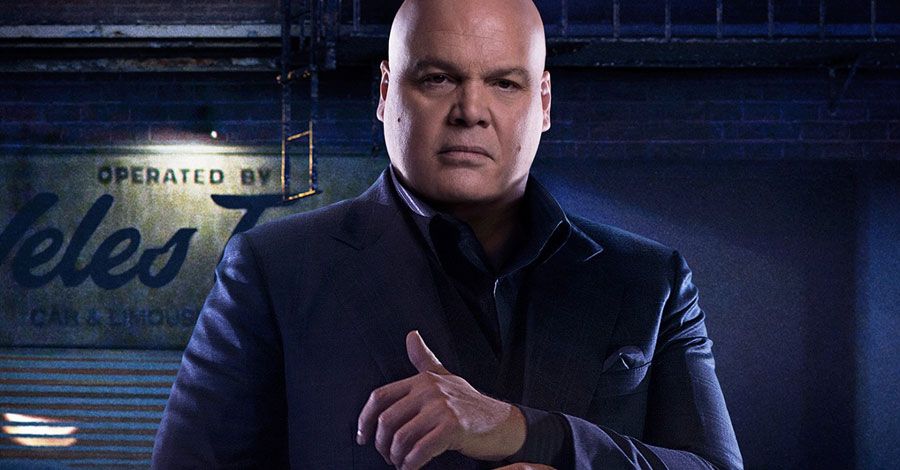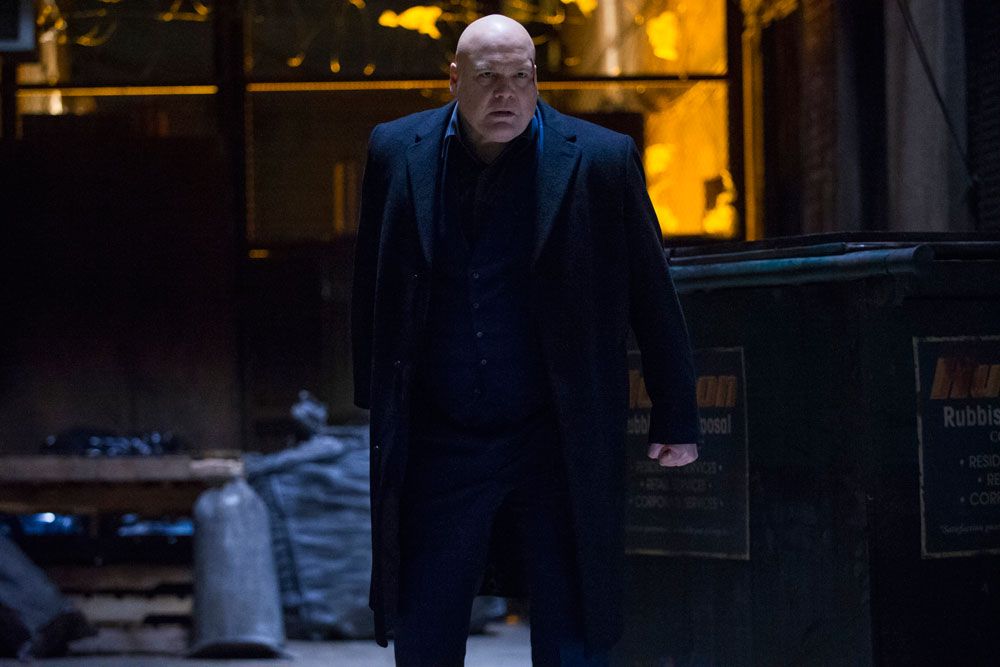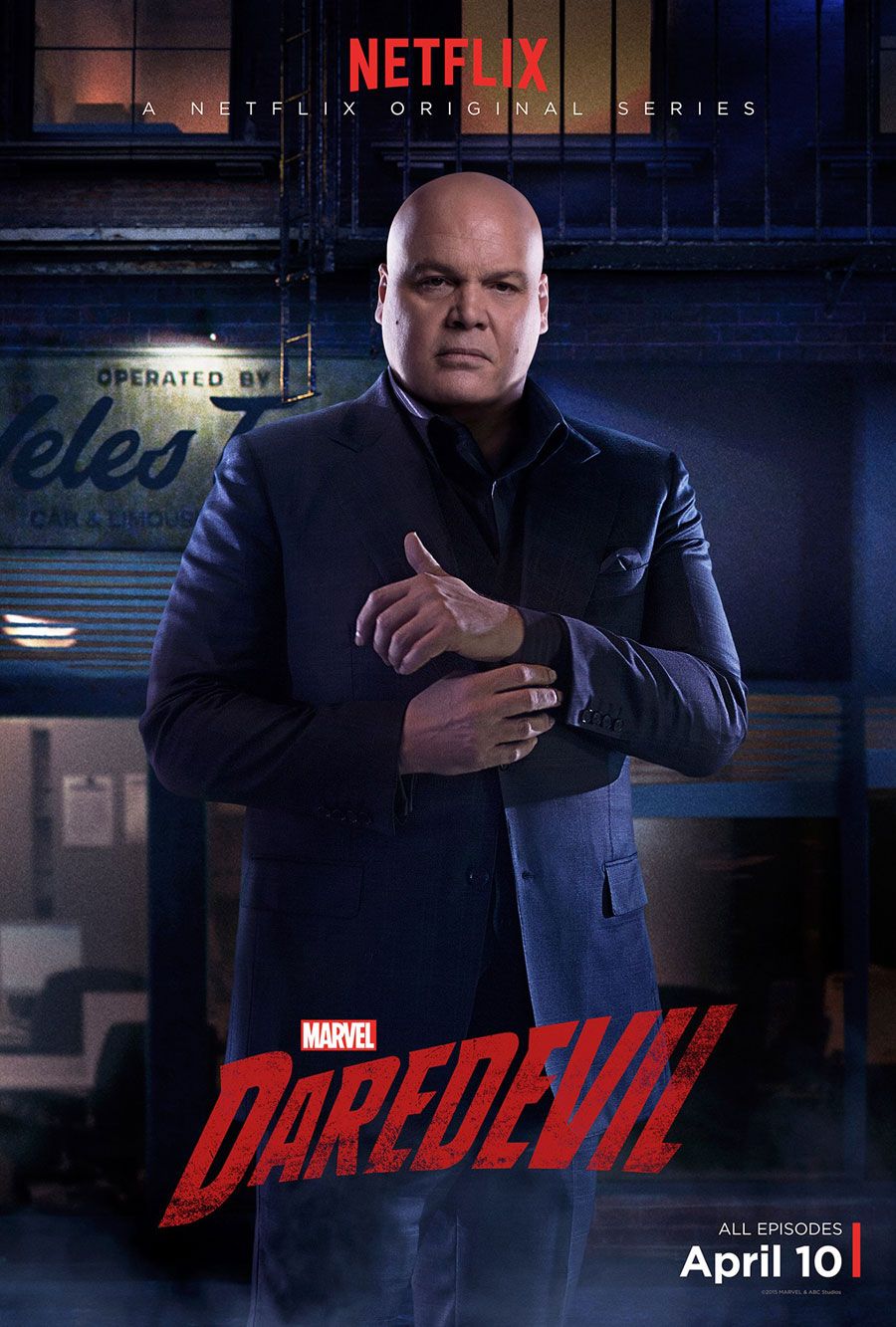As expected, Marvel's "Daredevil" Netflix series followed Matt Murdock's long, harrowed rise to heroism -- and, rather unexpectedly, the show tracked a similar course for Wilson "Kingpin" Fisk, albeit in reverse. Starting out as a man who believed his own good intentions despite his bad methods and uncontrollable temper, Fisk descends deeper and deeper into villainy as the first season unfolds, ultimately accepting his role as an antagonist just as Murdock fulfills his own heroic destiny. Fisk may be sympathetic, especially in his attachments to others, but he is undeniably rotten to the core -- and there's something decadently enjoyable about that, especially in the Marvel Cinematic Universe. While Marvel has diverted a lot of energy into its heroes' journeys, the films thus far have been decidedly less successful at pulling off the same for their villains (save Loki) until now.
Now, to be fair, "Daredevil" has an unfair advantage over the rest of the MCU. Where the films have roughly two hours to establish their heroes, and even less for their villains, the Netflix series had a good thirteen hours in which to play. Wisely, about half of that time was spent fleshing out Kingpin. Where we got a dozen or so flashbacks for Charlie Cox's Matt Murdock, so we did for Vincent D'Onofrio's Wilson Fisk, the two beginning as reflections of each other, poor boys who grew up in Hell's Kitchen and returned from their times away with a shared goal of making it a better place, albeit by very different ways. In the beginning, Murdock has his good friend Foggy, his new acquaintance Karen and a dozen or so associates through his practices; likewise, Fisk brings Wesley, his paramour Vanessa and his various crime connections to the table. However, the two diverge very clearly from there, with Murdock trying his best to preserve Hell's Kitchen's community integrity while Fisk does his damnedest to gentrify the whole thing.
RELATED: "Daredevil" Showrunner Steven DeKnight Talks Season One's Twists and Secrets
What would Daredevil be without his Catholic imagery? From a mentor priest, to the sisters of St. Agnes Orphanage, to the parable of the Good Samaritan, the show overflows with it. Until the very last episode, Murdock is called "The Devil of Hell's Kitchen" by the public and the press. This puts him in a very tenuous position, one that has him at odds with the people he tries to save, no matter how contrived that image is by Fisk himself. Beleaguered and besieged, Murdock must soldier on, beset as he is by the media, law enforcement, the press and the public. He works endlessly to put an end to insidious evils like human trafficking and gang violence, without credit and without thanks. Excessive violence aside, Murdock is very much a Christ figure, a spat-upon savior who must combat his self-doubt in order to better his community. That isn't to say it's a perfect allusion; the Christ of Murdock's faith was a peaceful man, albeit with a righteous temper, where Murdock is rightfully accused by Foggy of being borderline obsessed with violence. Nevertheless, the allusions exist, and they set up another parallel between Murdock and Fisk.
On the other hand, Fisk descends upon Hell's Kitchen like a messenger from God, with tidings of joy. Though the audience has gotten a taste of his bad side by the time of his big media reveal, the citizens of New York couldn't be more clueless, as he appears with no public record whatsoever -- not good, not bad, just one big tabula rasa. Of course, insiders like Murdock smell the machinations as soon as Fisk hits the press, but to just about everyone else, he's a blessing sent to rescue the city from itself. As such, Fisk owns his own Biblical image in parallel to Murdock: the Anti-Christ. Depending on what flavor of Christianity you favor, the Anti-Christ often goes hand-in-hand with the False Prophet who, along with Satan himself, form the unholy trinity. In this iteration, the show seems to be leaning more towards the composite approach, which treats the pair more as one entity than as two-thirds of the unholy trinity. The title "False Prophet" sounds exactly like what it is: A figurehead who arrives in splendor, singing false promises in order to gain the trust of his flock, shortly before herding them down the path of damnation. Like the False Prophet, Fisk first appears to the public with a gleaming vision of Hell's Kitchen transformed -- after a great purge, of course.
As it turns out, early Christianity is filled with pretty convincing super evils, so it benefits the show that the writers took a page out of the Bible. There's something about Fisk's reach that feels all encompassing, insidious and total. Wherever Murdock and his friends turn, whatever they do, Fisk has his fingers in it. He's behind everything, yet he's nowhere in sight, virtually untouched by the destruction left in his wake -- thanks to blaming it on the Devil of Hell's Kitchen, of course. Fisk manages to turn the public on Murdock with the ease of flipping a switch. At the same time, he's able to meticulously control his image, to the point that he almost becomes a mayoral candidate. His spotless public image belies his true sinister nature and machinations.
That being said, Fisk isn't a great villain simply because his reach extends to all the corners of Hell's Kitchen. Rather, he's presented as Fisk a truly complex, sympathetic character. Of course, I don't mean that in the sense that his motivations justify his actions; the show specifically puts a face to people like Señora Cardenas in order to illustrate just how very wrong his methods are. Despite that, however, you can't help but root for him in his personal relationships. Fisk truly cares for the people closest to him, like his mother, especially after they survived an abusive situation together. When Wesley is killed, his grief is genuine. As he struggles to overcome his personal insecurities while courting Vanessa, he fumbles, gets frustrated and loses the slick finesse he has when dealing with far more intimidating people like Madam Gao. As his relationship with Vanessa blossoms, it's easy to cheer for them as a couple; their chemistry rolls off their violent, police-filled engagement. Fisk isn't a figure of pure evil, a one-dimensional prop hurled against the protagonist; he is absolutely human in his history and relationships.
Further, Fisk clearly doesn't realize his role in the story until the very last episode. Throughout twelve episodes, he has himself convinced that all that he does -- the embezzlement, the gang running, the murders -- is all for a better cause, in very much an "ends justify the means" type way. By the final episode, however, Fisk has experienced an epiphany, a self-revelation. As he's carted off to prison, he relates the tale of the Good Samaritan, a Biblical parable that tells of a traveler who is robbed and beaten, only for a priest and a religious man to pass him by; it's the stranger, a godless man, who stops to help, for no reason other than the fact that the traveler needs it. "I always thought I was the Samaritan in that story," Fisk says plaintively, perhaps a little heartbroken at the fallacy of it. "Funny, isn't it? How even the best of men can be deceived by their true nature?" His story comes to a point here, as he recognizes and acknowledges aloud what he is: "I'm not the Samaritan... the priest, or the Levite. I am the ill intent who set upon the traveler on a road that he should not have been on."
In this one line, Fisk's story comes full circle. While there is nothing inherently wrong in admitting one's flaws, this isn't Fisk's grand awakening in the sense that he plans to change his ways. On the contrary, the speech is followed by an enormously violent outburst as he battles Daredevil head on. Fisk immediately embraces his inner darkness, showing no remorse for his actions, barring that brief moment of self-actualization. Like many of Marvel Studios' villains, Fisk set out with a purpose: to clean up Hell's Kitchen. Unlike most Marvel villains, however, Fisk is fully aware of himself in the grander scheme of the story; what's more, he recognizes his role and accepts it, and he doesn't appear to barter with himself or his chances of redemption. Regardless, while he owns his own villainy, his ties -- particularly to Vanessa -- remain intact. There's almost a whimsical element to her final scene, as she stands on the helicopter pad, hopeful that he'll make it back to her -- and it's very easy for the viewer to want that to happen, for both her sake and his. Fisk is the villain of this story, but that makes him no less human or sympathetic.
RELATED: "Daredevil's" D'Onofrio, Leonard-Moore & Gerald Discuss Their Hell's Kitchen Ambitions
Further, his relationship with Vanessa embellishes this villainy. It's refreshing to have a female character who doesn't shrink from the ambition of a character like Fisk, but rather fuels his fire while knowing full well what he's about. In the comics, Vanessa originally encouraged Fisk to become a better man; this has changed throughout the years (she killed her own son in Fisk's defense -- yowza), but from the get-go, her television incarnation is no shrinking violet. On her second date with Fisk, she brings a gun; when she learns he's to blame for the destruction of the Russian mob, she responds only with "good" as she watches them burn. She hears Fisk describe his father's murder with aplomb, and she couldn't have looked more lovestruck than when the police swarmed his apartment during his proposal. Unlike Matt Murdock's connections, Vanessa supports Fisk unconditionally, and even spurs him to reach his epiphany. She's enigmatic but serves as an excellent partner-in-crime for Fisk, though hopefully season two explores her character more now that Fisk is imprisoned (albeit not for long, I'm sure) and she is out on her own. Nevertheless, as much as Vanessa motivates Fisk, she likewise grounds him, offering the audience a relationship to root for with genuine -- if twisted -- chemistry.
In Wilson Fisk, the Marvel Cinematic Universe has found itself a decadently devious villain, different from his comic book counterpart but no less compelling. As "Daredevil" extends into a second season, the promise of even more villains -- like Bullseye and (occasionally) Elektra -- arises, but the show would most benefit from returning to the Kingpin and exploring his emboldened ruthlessness now that he has accepted his prescribed role in the story. And though many viewers have every confidence that the show will do justice to whichever villain it adapts next, I hope we see more of our favorite match made in Hell.



